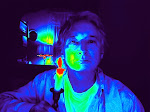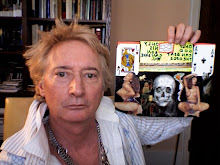Chapter Two
Seeking a way to ease into the day's work, he came across an interesting but unrecognizable scrap of text. He could not remember just when it had been conceived and executed. In fact, he could not recognize it as his own. It was directional, but unclear in the absence of a map. A writer he greatly admired had strongly recommended a map, not so much as a guide to a destination as a means of holding the city of his imagination in place. There was no place in the world that required more urgently a strict demarcation of boundaries than the imagination’s zone of compressed anxiety and fatigue. Inclusive of both points of departure and destination. It made sense. Far more sense than the linear series of road signs and mile markings that did more to limit exploration than to allow it proper evolution. And the only problem the writer could see at this point was that even the bare guide, the list of stopping points he had carelessly enumerated years ago had worn such a path in his mind that the idea of stepping away from it at this point was frightening and left him paralyzed, all but impossible.
Still a new map was easier than the story through the depicted but wholly imaginary territory would be. He began on a map planned not from reality, not a map of this world, but a map of the territory of his imagination. To the north, woods and fields. To the south, a Great Lake. West was the road to the next big city. East was another Great Lake and another country. At the nexus of these geographical features stood a fort, set in a fold between dry brown fields and a scattered handful of log and plaster homes. The town surrounding the fort had the wind-blown and weather-rotted look of wreckage, as if it had been built by despairing ghosts in too great a hurry to conceal the effects of a meteorological catastrophe.
The vocabulary was recognizable as his own. Dim constructions like "greatly admired" and strongly recommended" were unfortunately familiar. So was a hasty confusion between pronouns "he" and "me," suggesting a loopy confusion about exactly who was telling what to whom. Literal and linear, carelessly enumerated, even the notion of ghosts who might "despair" about having to hurry (why?) to conceal a "meteorological catastrophe" (of what sort?) ... He had a horror of plagiarism. Considering the situation, he reached an uneasy compromise in the idea that any disordered state that made him forget the composition of a chunk of text would have been left its marks on the text itself. But it was interesting to review one's writing from complete unfamiliarity. You were more careful. It wasn't a bad position from which to judge one's work.
Write or Die
May 4, 2008
It makes for interesting television. Chefs, dress designers, ballroom dance teams (with "stars" from forgotten sitcoms and yesterday's news) ... So far no neurosurgeons or air traffic controllers.
With such a fertile field, why have no television producers risen to the challenge of seeking out "America's Top Writer!"
At the moment it isn't the purpose of this site to fill that gap. That's not to say the idea isn't attractive in itself. There's something comfortable about being free of the responsibility of drawing one's own conclusions based on one's own informed subjective judgement. Note the danger words in that last sentence: free. responsibility. informed. A triad of anxiety at this particular time.
About twelve years ago the British writer Martin Amis included in his novel The Information the following exchange between a Chicago talk-radio host and his guest, an obscure writer named Richard Tull:
"Don't you wish sometimes," said Dub, "that writing were just like sports? That you could just go out there and see who'd win? See who's better. Measurably. With all the stats."Richard thought about it. "Yeah," he said.
Yeah, says Richard Tull, believing heartily that all the stats would point to his superiority over his former friend, the world's favorite talentless scrivener Gwyn Barry. The Information, it's worth noting, was harshly received by critics when it came out. Sad to say, it was not even selected for Ophrah's club as Gwyn Barry's Amelior certainly would have been.
Well, there will be no stats here. What there will be is some of my current writing, offered to unwary interweb wanderers. And some of your writing, too, if you care to send any. And if I happen to like it.
If you would like to comment on my stuff, please do so. I'll be happy to read yours. Send me anything you're working on and I'll either comment on it in a reply, or maybe post it if you give me permission.
Subscribe to:
Post Comments (Atom)




No comments:
Post a Comment